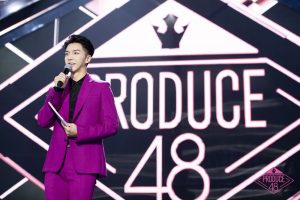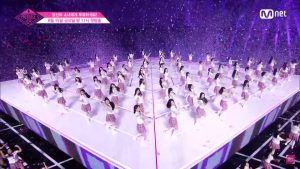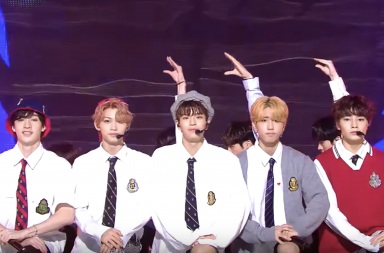 Produce 48 is the third and latest installment of the Produce series. While Produce 101 season 1 and 2 focused on female and male trainees from South Korean entertainment companies, this season offered a little bit of a twist: the presence of Japanese ‘trainees’ from J-pop group AKB48 and it’s sister groups (HKT48, NMB48, SKE48, NGT48). Another twist was that the stated goal was to create a global girl group. This girl group, composed of 12 girls, would promote in both South Korea and Japan for two and a half years. During this time, they would be handled by Pledis Entertainment‘s producer, Han Sung-Soo, and the producer of AKB48, Akimoto Yasushi.
Produce 48 is the third and latest installment of the Produce series. While Produce 101 season 1 and 2 focused on female and male trainees from South Korean entertainment companies, this season offered a little bit of a twist: the presence of Japanese ‘trainees’ from J-pop group AKB48 and it’s sister groups (HKT48, NMB48, SKE48, NGT48). Another twist was that the stated goal was to create a global girl group. This girl group, composed of 12 girls, would promote in both South Korea and Japan for two and a half years. During this time, they would be handled by Pledis Entertainment‘s producer, Han Sung-Soo, and the producer of AKB48, Akimoto Yasushi.
As this is the third season, the evaluations have basically been standardized. There are eliminations after the Song Evaluation, the Position Evaluation, and Concept Evaluation. The final lineup is voted through a pre-voting and live voting period during the live finale where the remaining trainees perform their Debut Evaluation.
So how did this season go? Well, we can start with the positives and work our way to the negatives.
The Positives …
 The biggest positive from this season was perhaps the potential to introduce K-pop fans to J-pop and vice versa. Of course, AKB48 isn’t the norm, but it can’t be denied that they are incredibly popular. It is also from this season that we can also compare the approaches of Korea and Japan when it comes to female, mainstream idols. The comparison is especially strong during the first two episodes, although it fades as the Japanese trainees find their way through the Korean training system.
The biggest positive from this season was perhaps the potential to introduce K-pop fans to J-pop and vice versa. Of course, AKB48 isn’t the norm, but it can’t be denied that they are incredibly popular. It is also from this season that we can also compare the approaches of Korea and Japan when it comes to female, mainstream idols. The comparison is especially strong during the first two episodes, although it fades as the Japanese trainees find their way through the Korean training system.
Another positive was the potential sharing of training and skills – Koreans are more technically sound, while the Japanese girls are more charismatic in the sense that they appeal to the crowd rather than just sheer perfectionism. The stated goal of a global girl group would need both. The gap between the training was easy to see in the first two episodes, but one of the greatest things to watch with Produce is how trainees evolve. For the most part, the Japanese trainees that lasted until the Position and Concept Evaluations truly did evolve and get better. It may be because their first evaluation songs truly didn’t show their potential, as if the company had let them do their own thing to showcase what they are good at; something they weren’t trained to do.
 Related to this, the underdog story is an overused trope for a reason: when it’s done well, it can do wonders in terms of support for a team or person. In this case, the Japanese trainees were definitely the underdogs. As some openly said in the first episode, they felt that while Korean idols could easily be seen as artists worldwide, J-pop idols tend to stick to Japan and do not get as much popularity or press when they go abroad. The key to landing the underdog story is to showcase the harsh lengths the underdog would undertake to achieve his or her goal. For Produce 48, this was through Japanese trainees being singled out for working on their Korean and for training just as hard as the Korean trainees.
Related to this, the underdog story is an overused trope for a reason: when it’s done well, it can do wonders in terms of support for a team or person. In this case, the Japanese trainees were definitely the underdogs. As some openly said in the first episode, they felt that while Korean idols could easily be seen as artists worldwide, J-pop idols tend to stick to Japan and do not get as much popularity or press when they go abroad. The key to landing the underdog story is to showcase the harsh lengths the underdog would undertake to achieve his or her goal. For Produce 48, this was through Japanese trainees being singled out for working on their Korean and for training just as hard as the Korean trainees.
It’s a weird positive to point out, but it worked. The underdog story was alive and working wonders during the season.
Lastly, the training team was excellent this season. The training team consisted of Soyou and FT Island‘s Hongki for Vocals, Cheetah for Rap, and Bae Yoon-Jeong, Choi Young-Joon, and May J Lee for Dance. I would say these trainers were better than previous seasons, if only because they didn’t have the vocal trainer for Twice involved. Soyou and Hongki were both very nurturing and encouraging to the trainees, while still being tough when needed. Cheetah’s been with the program since the first season and as such is a veteran with what is needed to be said. The Bae is reliable and never holds back, but the inclusion of Choi and May J Lee were great additions, with both having a great dance and choreography backgrounds. Like BoA, Lee Seunggi was also an excellent National Producer Representative – probably because he didn’t try to baby talk to the trainees or treat them as if they were children. Instead, he seemingly did his best and imparted good advice for them, based on his years as a singer.
… And The Negatives
Oh boy, where do I even begin?
There is Mnet’s ever-reliable evil editing. We all know about it, we all hate it, we all roll our eyes whenever it gets heavy-handed. Which would be often. As such, do I even need to add anything else?
The song selection sucked – seriously, SNSD is also huge in Japan, or was at least. Would it kill them to have another song other than “Into the New World?” I would argue that “Genie (Japanese Version)” would have been a great challenge song. If it was for a vocal-heavy song, there are so many other Japanese groups that do have great songs for harmonization and to show off the trainee’s range. Surely there were other options. In relation to this, BTS‘s “The Truth Untold” as a vocal song selection, and BlackPink‘s “Ddu-Ddu-Ddu-Ddu” were also weird as they are not exactly the first thing that comes to mind for vocals. The former managed to at least sound convincing, but the latter? Depends on who you ask if it’ll be considered a mess or just alright.
As this is the third season, you can’t help but compare it to the other two. Looking back, Season 2 was such an improvement from Season 1 in terms of song selection. It brought hope that this season would also have great songs, especially with the potential to tap into Japanese songs as well, even if it were just Japanese releases from Korean acts. A Tohoshinki ballad for a vocal performance would have been amazing! But that was just not to be. So instead, we got some really weird song selections, but at least the trainees made it work. For the most part. Looking at you, “Boombayah” performances.
Finally, this season has had a low number of votes, something that is made pronounced when you compare the votes for the final line up. This is perhaps the main reason why the rankings were so volatile and those in the lower ranks could easily become in the upper ranks (plus Mnet actually not editing them out). The vote gap between trainees was not obscenely large and could easily be overtaken to move up.
 Nonetheless, the number of votes for the final lineup has decreased when you compare it to last season where you needed to have over 790,000 to even get in the final lineup. Of course, this is comparing the results of PD48 to season 2 which had male trainees. When you compare it to the first season, the difference is even clearer and the small vote gap glaringly obvious. Yeunjung came in 11th with just over 136,000 votes, and Somi came in first with over 858,000 votes. For PD48, Chaeyeon came in 12th place with 221,273 votes, with Wonyoung coming in first with 338,366 votes. One one hand, there is a bigger number needed to make it onto the team. On the other, the votes needed to become number one have decreased significantly.
Nonetheless, the number of votes for the final lineup has decreased when you compare it to last season where you needed to have over 790,000 to even get in the final lineup. Of course, this is comparing the results of PD48 to season 2 which had male trainees. When you compare it to the first season, the difference is even clearer and the small vote gap glaringly obvious. Yeunjung came in 11th with just over 136,000 votes, and Somi came in first with over 858,000 votes. For PD48, Chaeyeon came in 12th place with 221,273 votes, with Wonyoung coming in first with 338,366 votes. One one hand, there is a bigger number needed to make it onto the team. On the other, the votes needed to become number one have decreased significantly.
Either way, why could there have been such a significant decrease? This could be due to a number of reasons. Maybe it was due to the lack of a great talented find that you wanted to vote for. Maybe it was because of Produce fatigue. Or maybe, it was because everyone was used to Mnet’s ways and didn’t bother voting, knowing that Mnet has their faves and that shenanigans would ensue.
The Final Line Up
We’re all used to K-pop lineups — there is always that useless member, but they usually have some sort of interesting presence around them. Not only that but with 12 members, there will be plenty who will not have a full line. For the debut evaluation, it is noted that sub-vocalist positions 5 to 9 barely had a line at all, with some only have three letters. And it showed in the final performances. There are limited lines and yet there are 12 girls. Hopefully, whoever is in charge of song production will ensure those that can actually carry a note (at the very least) handle the long lines and give those that passed on their visuals alone that one line.
Good luck to our ears when the official songs get released. I anticipate plenty of higher tones. Par for the course in K-pop, but it will be grating when you look at the vocals that the rest of the final line up has displayed. Hitomi tends to be in the higher range due to her natural tone, and the same goes for Eunbi. Chaeyeon, at least, has the potential to also have a larger vocal range, although she has so far been known for her unexpected high notes. Yuri is also a great addition to the lineup, as she does have steady vocals and her tone does differ from the childish and higher toned voices of Wonyoung, Sakura, Yujin, Chaewon, and Minju.
Then there is the actual number one, Wonyoung, who is 14 years old and is center. On one hand, you know, based on how they dressed her in previous challenges, that they will dress her up as if she’s already an adult. They well sexualize this minor. Hell, I still don’t understand why she chose to dance to Ariana Grande‘s “Side to Side” in the Position Evaluation; nor do I understand why they put her in super short shorts for “Rollin Rollin” which was cute and energetic and not a sexy or sensual concept at all. It’s Korea and I shouldn’t be surprised, and yet here I am.
Say what you want about Sohye, but the girl had energy! She improved! To be fair, she could only go up from where she started, but she did! And it showed! But Hyewon and Minju? Choose one, but both of them? They were truly unremarkable at all. I would argue that Hyewon is truly deadweight, the very definition of deadweight. It’s a miracle she even manages to keep up. Her vocals haven’t improved, her dancing is still rigid, her expression is lifeless. But oh, those big, innocent eyes that looked at the camera as she ‘rapped’ (aka spoke, lbr) during her performances, and Mnet gave her the angel edit of being mom-like to a Japanese trainee (Minami). Wow, sure, let’s vote her into the group. That totally makes sense over actually talented girls who were already ahead of her in the voting.
In a perfect world, the lineup would have been an even six Korean trainees and six Japanese trainees – a truly global group! But instead, it’s three Japanese girls and the rest are South Koreans. It’ll be interesting to see how AKB48’s producer handles this, and how Japanese activities will end up going. After all, Produce 101 has been compared to the senbatsu concept of AKB48 and it’s sister groups. Additionally, the team, who’s official group name is IZONE, will be together for two and a half years, promoting in both Korea and Japan. It can be assumed that IZONE will be handled like every other K-pop group that has been handled by Pledis Entertainment. How they will be promoted in Japan remains to be seen.
This season was a long ride, from beginning to end. From the Japanese trainees being singled out for their lack of training to tumultuous rankings, to Korean trainees that just did not shine enough, this season was a mess. While there were several standouts (such as Chowon from Cube), none of those standouts made it to the final line up. IZONE will be making their debut in the near future, and I know that despite my opinion on the makeup of the group, there is still the curiosity factor that will make me tune in. Not just because I’m a sadist, but because I truly am curious as to how their promotions will be handled when compared to I.O.I and Wanna One.
(YouTube, Images via Mnet)


